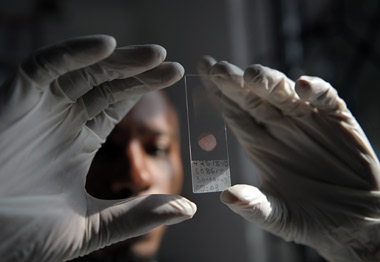TORONTO – The popularity of genetic testing is on the rise and more people are turning to expensive DNA tests to determine the future of their health.

Genetic testing uses genotyping, a process that evaluates DNA makeup to determine genetic differences, to project what risk a person has for developing a particular condition.
Common genetic tests include family risk assessments, which evaluate your family health history to determine your risk of disease, personal genome testing and pre-pregnancy genetic testing, which can evaluate an individual or couple’s risk at developing a child at risk of disease.
The tests come with a hefty price tag; some cost as much as $4,000.
But DNA testing may be the next trend in preventive medicine by weighing the risk of one’s illnesses.
Testing tumours
The ONCOTYPE-DX test, for example, tests the biology of tumours to decipher what form of treatment will be most effective in killing cancer cells. According to their website, the diagnosis changes the course of treatment 37 per cent of the time.
Breast cancer survivor Coree Hanczyk was one of the first people in Canada to have the ONCOTYPE-DX test.
After being told she would need chemotherapy, she paid $4,000 to have part of her tumour shipped to California for testing. The test revealed she did not need chemotherapy and saved her from the life changing side effects of the treatment.
“The ONCOTYPE DX test gives you a numerical assessment from zero to a hundred; one hundred being a high score, meaning obviously chemo is very, very necessary,” said Hanczyk during an interview with Global National’s Jennifer Tryon.
Her test came back with a score of 13.
- Roll Up To Win? Tim Hortons says $55K boat win email was ‘human error’
- Bird flu risk to humans an ‘enormous concern,’ WHO says. Here’s what to know
- Halifax homeless encampment hits double capacity, officials mull next step
- Ontario premier calls cost of gas ‘absolutely disgusting,’ raises price-gouging concerns
“There is no price tag. It’s the best thing I’ve ever done in my life,” she said. “I want to know everything there is to know about my body- that tumour was inside my body. I wanted to know everything possible about that tumour.”
The test has become so reliable at predicting treatment options that Ontario, British Columbia and Quebec are now funding similar types of genetic tests.
DNA testing by mail
Other tests, such as the “23 and Me” test, allow healthy individuals to mail off their DNA and receive a detailed risk assessment, weighing their risk of various diseases in return.
“There are a whole bunch of different subjects of what you could be a carrier for. The only one I really looked at was the ones that I had a variable present, which was cystic fibrosis,” said Stephanie Holmes, who participated in the “23 and Me” test.
“I don’t actually have cystic fibrosis, but if I were to mate with someone who also has the same gene, I would have a one in four chance of having a child with cystic fibrosis.”
The test also showed 21-year-old Holmes that she has to watch out for heart disease later in life.
Doctors warn that these home tests aren’t always effective, cautioning that lifestyle and environment are also contributing factors, but for some like Holmes, these tests come with peace of mind.
“My whole future is not going to be based upon this one thing that I found in the test. But it does open my eyes a little bit more.”



Comments